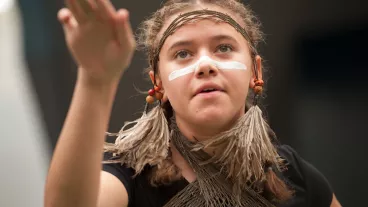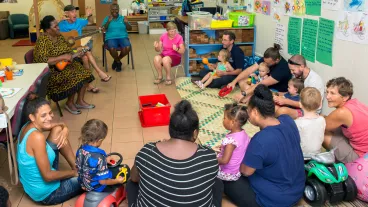Measuring progress towards genuine partnerships between Aboriginal and Torres Strait Islander and non-Indigenous organisations
December 2020
Andria Mastroianni
Aboriginal and Torres Strait Islander families and communities have unique richness, diversity and strengths in child rearing. The majority of these families are strong, resilient and nurturing. However, data show that some families are in need of additional support.1,3 Engagement with child and family support services is critical to strengthening Aboriginal and Torres Strait Islander families and improving life outcomes for vulnerable children. Genuine and respectful partnerships between Aboriginal and Torres Strait Islander community-controlled organisations and non-Indigenous service providers are key to providing this support and require a shared ongoing commitment.2 This short article outlines the findings of SNAICC’s audit of organisations’ progress towards achieving genuine partnership goals; identifying strengths and the areas still needing development.
What are genuine partnerships and what do they aim to do?
Genuine and respectful partnerships support self-determination and the leading role of Aboriginal and Torres Strait Islander people and organisations to support their children to thrive. These partnerships extend beyond consultation to provide the resources that genuinely give power to Aboriginal and Torres Strait Islander communities to design and implement policy and programs and to make the decisions about their children’s development and wellbeing.
Working within a cultural competence framework and engaging in effective partnerships with Aboriginal and Torres Strait Islander communities and organisations are key ways for non-Indigenous services to increase access to and engagement with child and family services for Aboriginal and Torres Strait Islander peoples.2
What’s the research about?
In February 2020, SNAICC invited Aboriginal and Torres Strait Islander and non-Indigenous services working in partnership to complete a voluntary audit of their partnership using SNAICC’s Genuine partnerships audit tool. The tool is available for all services to use and provides a framework for measuring progress towards achieving genuine partnership goals.
The 45-question online tool includes 39 Likert-style questions and six short-answer questions. Each question correlates to one of three partnership phases:
- establishing the partnership
- sustaining the partnership
- reviewing the partnership.
And one of four partnership domains:
- relationships
- capacity building
- cultural competence
- process, governance and accountability.
Partnerships receive a score for each phase and domain identifying their strengths and areas for development.
As part of SNAICC’s research, nineteen partnerships completed the audit, representing a mixture of organisations in urban, regional and remote settings. Of these partnerships, 17 non-Indigenous organisations completed the audit for the partnership.
SNAICC analysed the findings to better understand the development of these partnerships and will use the results to support partnerships to strengthen their relationship through SNAICC-facilitated workshops and resources.
What are the main findings?
Across the three partnership phases, on average, respondents self-rated their progress in their partnerships as highest for establishing the partnership (3.97 out of 5), lower for sustaining the partnership (3.53 out of 5), and lower again for reviewing the partnership (2.80 out of 5).
In the establishment phase, respondents reflected that they commonly began their partnership with an initial shared vision, common goals and a commitment to achieve better outcomes for Aboriginal and Torres Strait Islander children and families. In this phase, on average, respondents self-rated their identification of opportunities to build local Aboriginal and Torres Strait Islander organisational, workforce and community capacity as lowest (3.61 out of 5).
Across the four partnership domains, on average, respondents self-rated their cultural competence as highest (3.67 out of 5). Next highest was capacity building (3.58 out of 5), then relationships (3.31 out of 5). The lowest ranking partnership domain was process, governance and accountability (3.17 out of 5).
What do the findings mean?
Results of the audit process indicate interest, motivation and engagement in the first phase of establishing a genuine partnership is strong; however, over time, less attention and effort is placed on process elements and the work required to maintain a genuine partnership.
This aligns with the negative experience that many Aboriginal and Torres Strait Islander people have had of tokenistic relationships labelled as ‘partnerships’, which has led to a belief that some non-Indigenous organisations may use partnership to tick the boxes of cultural competence and community engagement, without a deeper commitment to sustainable relationships or local community empowerment.4
The audit responses revealed a clear eagerness and willingness on the part of the non-Indigenous organisations to do a better job at developing their partnerships.
In 2021, SNAICC will use the key findings from this audit to create a series of workshops to support a number of selected organisations to ensure their partnerships flourish in the long term. The workshops will focus on:
- Sustaining partnerships beyond initial enthusiasm and goodwill
- Mobilising resources within the partnership to build cultural, organisational and partnership capacity
- Building governance structures that work for both partners
- Establishing processes to support shared evaluation and reflection on the progress of partnership.
Engagement with child and family support services is critical to strengthening Aboriginal and Torres Strait Islander families and improving life outcomes for vulnerable children. Genuine and respectful partnerships between Aboriginal and Torres Strait Islander community-controlled organisations and non-Indigenous service providers are key to providing this support and require a shared ongoing commitment.
Acknowledgement
The Genuine Partnerships Project is a collaboration between the Australian Institute of Family Studies (AIFS), the Department of Social Services and SNAICC – National Voice for our Children.
Further reading and resources
- Creating change through partnerships – An introductory guide to partnerships between Aboriginal and Torres Strait Islander and non-Indigenous organisations in child and family services
This SNAICC resource provides guidance to services as to how best develop and maintain genuine partnerships between Aboriginal and Torres Strait Islander and non-Indigenous organisations. - Applying for funding – A guide to best-practice partnerships between Aboriginal and Torres Strait Islander and non-Indigenous organisations
This SNAICC guide has been designed to support Aboriginal and Torres Strait Islander and non-Indigenous organisations to consider and adopt partnership-centred approaches when applying for funding for Aboriginal and Torres Strait Islander child and family support services. - SNAICC’s Genuine partnerships audit tool
This SNAICC audit tool has been created to support inter-agency partnerships in child and family service delivery for Aboriginal and Torres Strait Islander children and families. It provides a framework for measuring progress towards achieving genuine partnership goals and can be used at all stages of partnership development.
References
1 Australian Early Development Census (AEDC). (2019). Australian Early Development Census national report 2018. Canberra: Department of Education and Training, Commonwealth of Australia.
2 SNAICC. (2012). Opening doors through partnerships. Melbourne: SNAICC.
3 SNAICC. (2019). The Family Matters report 2019. Melbourne: SNAICC.
4 SNAICC. (2020). Creating change through partnerships. Melbourne: SNAICC.
GettyImages/SolStock
Related publications

Supporting the social and emotional wellbeing of Aboriginal…
This webinar discussed how service organisations can work with Aboriginal communities to increase accessibility for…
Read more
Aboriginal and Torres Strait Islander self-determination in…
This webinar outlined recent initiatives that promote Aboriginal and Torres Strait Islander leadership and self…
Read more
Evaluating the outcomes of programs for Indigenous families…
Key considerations for those thinking about evaluating the outcomes or impact of a program for Indigenous families and…
Read more